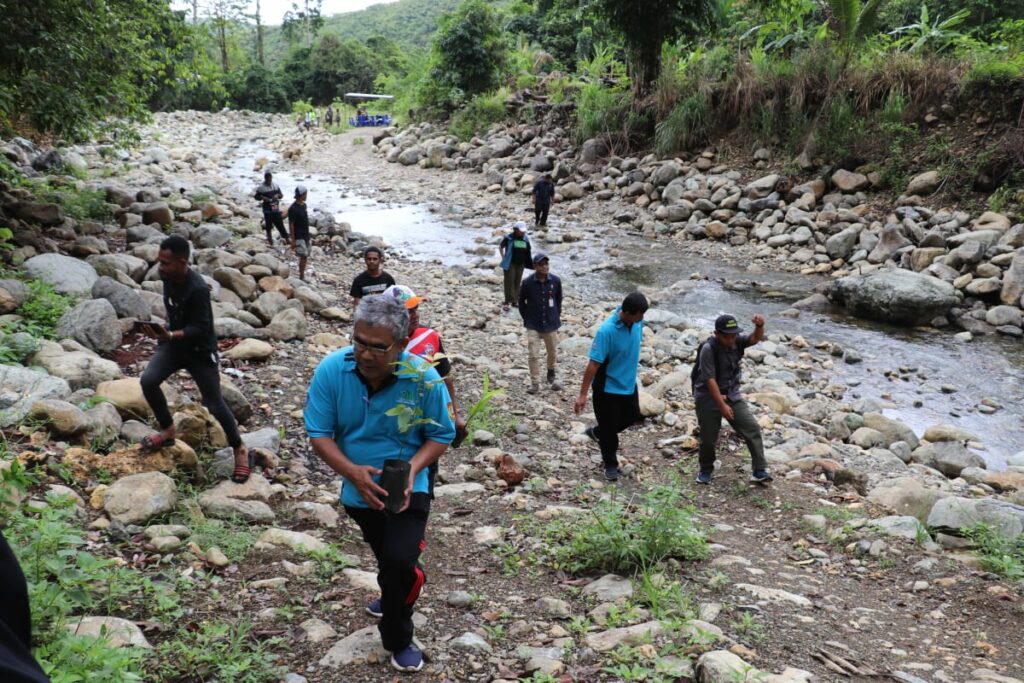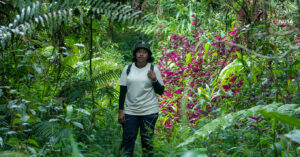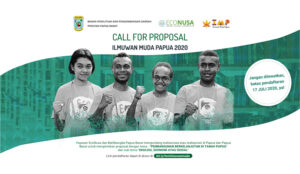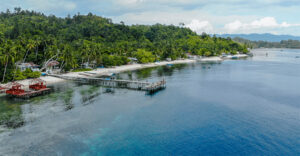
The source of clean water from the Kampwolker River, Jayapura, Papua is currently at risk. A team of students from the Faculty of Engineering, Cenderawasih University conducted a study at Kampwolker and explained that many activities result in a water quality decrease in the area.
“Kampwolker is one of the recreational destinations for local communities. Unfortunately the traditional farms that required land clearing in its surroundings, sooner or later may disrupt its function as a source of clean water,” said Raditya, one of the students who conducted the study at the EcoNusa Jayapura Office (30/6).
The Kampwolker River is one of 14 rivers that stream into Sentani Lake, Papua. Field study team coordinator at Kampwolker, Franklin Wakom, explained that the area is part of the Cycloop nature reserve area where all components of its ecosystem need to be protected.
Read Also: Research Result: Fishermen in the Maluku Islands are Unaware of Measured Fisheries Policies
Kampwolker is also one of the clean water sources that is managed by PDAM – now called PT Air Drinking Jayapura Robongholo Nanwani or Perseroda –. Because of the importance of its area to meet the needs of clean water for the people in Jayapura City, Franklin and the team hope that this area will always be protected.
Franklin and two of his friends are students from the Department of Urban Planning Engineering, Faculty of Engineering, Cenderawasih University who participated at Field Work Practices at the EcoNusa Jayapura Office in April-June 2023. Three other students also conducted a Field Work Practice that studied tourism potential in Enggros Village, Jayapura City.
The students that conducted a study around the Enggros Village explained the high tourism potential in its area. Massive support is needed to increase tourists visits and local communities’ income. ” We identify at least eight to ten challenges there,” said Sonny Iyai, team coordinator.
Read Also: Forest of Halmahera, A Threatened Enchantment
Sonny added that unsupportive infrastructure, lack of clean waters, messy cables and electricity poles, lack of trash cans or waste facilities and debris in water areas are some major challenges faced in Enggros Village. Improvement also needed in the services provided such as reduction on vehicles parking cost, security improvement at Ciberi Beach and Youtefa Bay, reduction on public toilet fee as well as improvement on local potential utilization.
Sonny and the team suggested several programs for Enggrose Village such as local communities capacity building, especially related to tourism management, providing tourism potential information boards, providing waste collection vehicles, and adding tourism-related supporting facilities.
Head of the Urban Area Planning Engineering Department, Elisabeth Wambrauw, expressed her appreciation to the students. According to her, tourism is a positive thing because it can improve the economy of the people in Enggros Village and add environmental value. The Enggros mangrove forest also has blue carbon potential. That’s why she agreed that mapping the challenges and potentials in Enggros Village is important. “It’s great what they do,” said Elisabeth.
Read Also: Homestay Rebuilding in East Arefi, An Economic Recovery Effort for Local Communities
Regarding the condition of the Kampwolker, Elisabeth said that from the results of the study, changes in land use were large enough to affect the available water discharge for Jayapura City. The development of new settlements around the river will also add to other problems, such as garbage, landslides, and other disasters.
This significant change, said Elisabeth, would make the spring water source unsustainable and very disturbing to residents in Jayapura City. “This will have a very big impact. This study is important input for EcoNusa and the government. These two small case study examples have presented the problems faced by the City of Jayapura,” said the Regional Coordinator of the Papua and West Papua Association of Indonesian Planning Schools (ASPI).
The Head of the Papua Regional EcoNusa Office, Maryo Sanuddin, appreciated the results of the study. He said he would use it as a source of information to implement activities for the city of Jayapura. “The results of this work will be an important source of information for us at EcoNusa and for other interested parties,” he said.
Editor: Nur Alfiyah & Swiny Adestika




